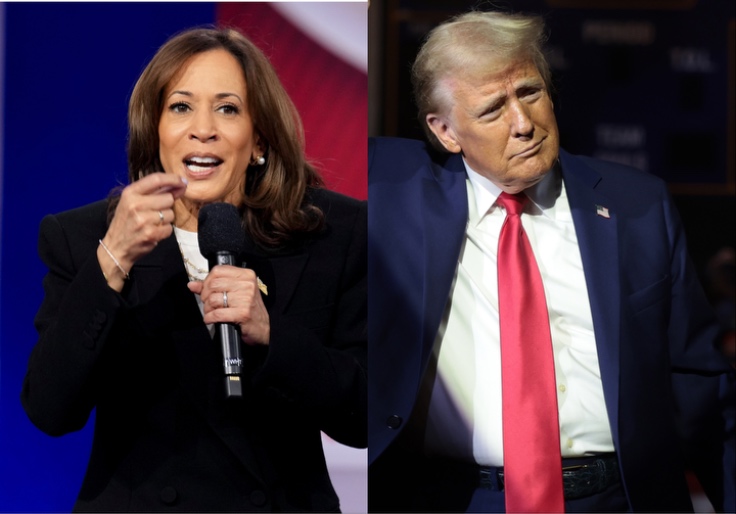It Takes Guts To Predict the 2024 Election
Column: How to tell if Harris or Trump has the edge

Whose gut do you trust—James Carville’s or Nate Silver’s? Democratic strategist Carville says his gut tells him that Kamala Harris will win the presidency. Data analyst Silver says that his gut tells him Donald Trump will be victorious. Both guts can’t be right.
Carville and Silver rely on intuition because the race is the closest it’s been in decades. At present, Harris and Trump are effectively tied in the RealClearPolitics average, with Harris at 48.7 percent and Trump at 48.5 percent nationwide. Trump is ahead in the RealClear averages of the seven swing states, but often by less than a point. His largest lead is in Georgia. It’s 2.2 percent.
All these results are within the margin of error. Hence the range of potential outcomes stretches from a Harris sweep to state-by-state squeakers to a Trump landslide. The data are so close, and so consistent, that they are almost unhelpful. These polls and prediction models are the equivalent of a shrug emoji. Either candidate could win. Neither has closed the sale.
Where to turn? The ancient Romans consulted augurs, who discerned the future by studying the behavior of birds. James Carville relies on emotion. His argument for Harris is heavy on the pseudo and light on the science. He offers three reasons he’s “certain” that Harris will be the 47th president. One, Trump has lost before. Two, Harris has the cash advantage. Three, “It’s just a feeling.”
Well, then. I have feelings, too. That doesn’t mean I use them to predict an election or make a case in the New York Times. Feelings are, as the chairman of the board said, nothing more than feelings. Leave them aside.
Carville’s other reasons are more substantive. Trump and Republicans have lost many contests since 2016, beginning with the House of Representatives and key governorships in 2018 and extending through the presidency in 2020 and the Senate in 2022. Two years ago, Republicans barely won the House, failed to capture the Senate, and flipped a single governor’s mansion. Many poll-watchers, including this columnist, expected a Red Wave. It never reached the shore.
The same could happen again. Keep in mind, though, that Trump was not on the ballot last time. And that Trump is more popular and doing better this year than at any point since he rode down the escalator of Trump Tower nine years ago. And that Trump gained votes between 2016 and 2020, despite losing. That hasn’t happened since 1888, when incumbent Grover Cleveland lost to Benjamin Harrison. Cleveland won back the White House four years later.
Money is necessary but not sufficient. Trump was outspent in 2016, and the GOP won a trifecta—the presidency, House, and Senate. Michael Bloomberg spent more than a billion dollars on his Democratic primary campaign in 2020. It bought him American Samoa. Money helps promote your product, but advertisements won’t matter if people don’t like what you’re selling. “The picture of the prettiest girl that ever lived,” Joseph Schumpeter wrote, “will in the long run prove powerless to maintain the sales of a bad cigarette.”
Plenty is wrong with the Democratic brand. Two-thirds of the country say we are headed in the wrong direction. Most Americans say they are worse off than four years ago. The incumbent president’s job approval has been underwater for more than three years. The Democratic nominee’s favorability ratings have fallen back to earth. Voters prefer the Trump years to the Biden years. They trust Trump more than Harris on the economy and inflation and the southern border and immigration and foreign policy and the Middle East. For the first time in decades, more voters identify as Republicans than as Democrats.
Which is why Nate Silver disagrees with Carville. “If Mr. Trump does beat his polling,” he writes, “there will have been at least one clear sign of it: Democrats no longer have a consistent edge in party identification—about as many people now identify as Republicans.” Combined with nonresponse bias, where Republicans are undercounted in polls because they are harder for pollsters to reach, GOP strength could hand Trump a major win.
Not that Silver is making a prediction. After all, Trump’s majority relies on low-propensity voters. Harris’s does not. Depending on the makeup of the electorate, Harris could overperform. According to Silver, if Harris benefits from a typically sized polling error, she will win by the largest margin since Barack Obama in 2008. But there’s reason for skepticism. “I don’t think you should put any value whatsoever on anyone’s gut—including mine.”
This intellectual humility is rare and valuable. And no fun. Political junkies are anxious to see this remarkable election come to an end, and to know the outcome. And we want to know now, not in 10 days. Without our guts, what’s left? Take in the latest polls, refresh the early vote updates. I’m going Roman and studying the birds.




